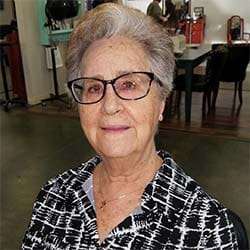Suspect a Stroke? Every Minute Matters
Prompt Response by PIH Health Helps Whittier Woman Enjoy a Full Recovery

Teresa Wroblewski
Spending time at home.
One morning, when 89-year-old Teresa Wroblewski was pouring herself a cup of coffee, she suddenly felt like she might faint. Her daughter, a registered nurse, helped her back to bed, but realized she was having trouble forming words. Teresa’s blood pressure was also higher than normal. The symptoms disappeared but returned a few minutes later.
Teresa’s daughter suspected her mom may have had a stroke—in which case, every moment matters. She quickly called 911, and Teresa was brought to PIH Health Whittier Hospital for evaluation.
While at the hospital, Teresa’s symptoms became more apparent—this time with facial drooping on the right side, inability to form words, and tingling and numbness in her right fingers and toes.
“After discussions with the family, we decided to administer tissue plasminogen activator (tPA), a medicine that works to dissolve blood clots,” said Adrian Burgos MD, PIH Health neurologist. “This therapy works best when delivered within three hours of stroke symptoms, so it’s always important to take signs of stroke very seriously and to act quickly.”
Thanks to excellent care from her medical team, Teresa’s outcome was phenomenal. She stayed in the hospital for three days before returning home. Today, she has no lingering effects from her stroke and is back to volunteering on Tuesdays at PIH Health.
Time is critical for anyone having a stroke. You can recognize a stroke by thinking “BE FAST.”
- B - Balance: Loss of balance
- E - Eyes: Lost vision
- F - Face: Face drooping
- A - Arm: Arm weakness
- S - Speech: Speech difficulty
- T - Time: Time to call an ambulance
For more information on stroke care at PIH Health, visit PIHHealth.org/Stroke.